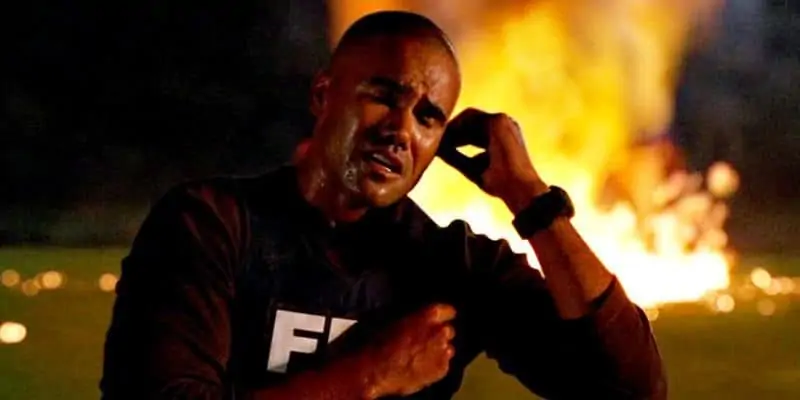Spoilers ahead!
It doesn’t take a whole lot of brainstorming to realize just how much season 6 of Dexter and season 2 of The Walking Dead have in common — some good, and some not-so-good.
Both shows center on death (though on Dexter, the dead only die once) and feature a whole lot of thrilling gore, punctuated by (sometimes vastly less interesting) character drama. The central characters struggle to do good despite — or, often, with — their darkest impulses, and to find hope when everything should feel most hopeless. Yes, most gripping TV dramas also grapple with these issues in one way or another. But not all of them feature lengthy debates about morality between main characters and their cynical Ghost Brothers, or body counts higher than the Chrysler building, or repeated depictions — whether actual or in “tableau” form — of the apocalypse. Dexter and The Walking Dead both do.
But beyond those rather obvious similarities, the current seasons of Showtime’s serial killer series and AMC’s zombie epic have something else in common: After setting up promising plot lines in their season premieres, both shows chosen slow, inconsistent, seemingly interminable paths through those plots. Sure, there have been entertaining pit stops along the way — but that’s clearly and exactly what they were. Pit stops. Coming into both of last night’s episodes, the biggest similarity between Dexter and The Walking Dead is that both shows have been taking us places that aren’t very interesting, and taken entirely too long to get there.
But, again revealing their likeness, both shows sought to change all that in the final minutes of last night’s episodes, each revealing a major twist meant to propel the rest of season, if not in an exciting direction, at least somewhere at a faster rate.
Unfortunately for the Dexter writers, The Walking Dead‘s big twist had an exponentially bigger pay-off. Because it was actually a twist.
Last night, we “learned” that the Doomsday Duo was actually the Doomsday Solo. Dexter finally opened the deep-freeze and discovered, much to his surprise, that crazy Dr. Gellar is long dead, and that it’s been lowly, sympathetic Travis, serving his own mentor-turned-mental-projection, doing the killing all along. Most of us figured this out a long time ago (around the time when Gellar, with his face plastered all over the papers, continued to waltz around in public), though I admit I wrote off the theory after we saw Travis talk to Gellar on the phone. And heard Dexter say, no words minced, “Travis has a Dark Passenger all his own. But unlike mine, his walks and talks and breathes and goes by the name Professor Gellar. And most significantly, his Dark Passenger can be killed.”
The show wouldn’t actually explicitly declare that a character wasn’t imaginary, then turn around and reveal that he’s been imaginary the whole time, and make that the season’s big “twist,” would they?
Yes, unfortunately they would. And now I feel like those dinner theater patrons on Bob’s Burgers who had to point out to Linda that there’s a difference between a “twist” and a “lie.” And now I too, want my money back. (By “money,” I mean time, which equals money, especially for us busy couch potatoes.)
Worse, even if the “twist” actually did surprise you, that doesn’t magically go back and turn what led up to it into a good season of Dexter. Real or imaginary, as a villain, Gellar was unrealistic and unmenacing. Travis was creepy and untrustworthy, and Dexter, once a sharp detective, trusted him. Because Dexter has been too busy wading around in basic religious concepts to realize what should have been obvious to him a long time ago. Maybe it’s Dexter, maybe it’s us — but one thing’s certain. This show isn’t giving somebody around here enough credit.
At certain points this season, I’ve rooted for almost every character on The Walking Dead to die, because the show has a disappointing tendency to force its characters into making really stupid choices as its way of building conflict and tension. But last night’s mid-season finale twist delivered, partly because the writers made a truly unexpected decision. (No, not to have Shane flip out and release the walkers from the barn. We all saw that coming, though it was no less awesome for being expected. That man can yell.) Normal TV logic would tell us that the longer Sophia went missing, the more likely they’d be of finding her alive and well — thereby reinforcing the values of hope, team-playing and a “no man/woman/child left behind” mentality in this nightmare hellscape. Sophia is saved! Hope lives after all! Hug. High-five. Next chapter.
But — to our horror and twisted delight — no. Instead, after most of the group cruelly and triumphantly killed Hershel’s “sick” zombie friends and family, one last little walker shuffled out of the barn. Sophia. She was dead the whole time. The hope the group had been desperately holding on to was dead the whole time. And in the same moment that “kill or be killed” Shane froze, remembering it’s a little different when the zombie is your zombie, Rick proved once again why he’s the boss, as the only one with the stones to put Sophia out of her mostly-brain-dead misery.
It sounds sick, but I’ve never been so happy to learn that a (fictional!) missing little girl was dead — because the show didn’t play it safe, and didn’t give us the same old lesson. And it was brilliant to see all the ongoing character tensions actually enhance the action and suspense. It was a long time coming, but in that moment, The Walking Dead drew me back in. (Of course, the show that doesn’t return until February left me wanting more, while the show that returns next week left me dissatisfied and annoyed. Typical.)
At their best, Dexter and The Walking Dead are extremely satisfying because both shows are adept at achieving that action-drama blend; at telling dark, gruesome stories in an extreme, but still human, way.
Unfortunately, only one show was at its best last night. And, by watching the episodes back to back, I’m even more convinced that Dexter was at its worst. Similarities can be a bitch that way.
(Images courtesy of Showtime/AMC)

Senior Writer, BuddyTV
Meghan hails from Walla Walla, WA, the proud home of the world’s best sweet onions and Adam West, the original Batman. An avid grammarian and over-analyzer, you can usually find her thinking too hard about plot devices in favorites like The Office, It’s Always Sunny in Philadelphia, and How I Met Your Mother. In her spare time, Meghan enjoys drawing, shopping, trying to be funny (and often failing), and not understanding the whole Twilight thing. She’s got a BA in English and Studio Art from Whitman College, which makes her a professional arguer, daydreamer, and doodler.

